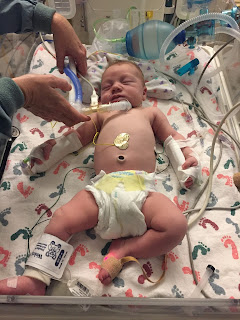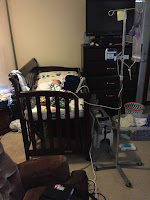The previous week, the doctors had taken us to another trach patient's room so we could see what to expect. It was devastating. The child was crying while we were in his room, but you couldn't hear a sound coming from him. It still makes my stomach drop to think of that sweet child. Needless to say, Lance and I were not encouraged by the visit. We also didn't find it encouraging when another doctor stated, "I don't know why parents think trachs are a big deal, they aren't."
I would like to say that is an incorrect assessment. Trachs are a BIG deal. Aside from all of the emotions that come from the process, there is a series of unfortunate side effects. We were sent home "trained" on how to care for a baby with a trach. The training wasn't sufficient. We weren't prepared for how life would be at home. We were overwhelmed and unqualified. We left the hospital stressed, depressed and scared. These are the things I wish that I had known prior to leaving the hospital.
10 Trach Tips
(for parents to know before leaving the hospital)
1. Seek Financial HelpAs soon as the trach talk starts, parents need to start researching how to get financial aid. Start applying for any program you can think of that may help. Even if you don't think you will qualify. If you don't already have Medicaid, start learning how to obtain one of their numerous programs to help with all of the costs you are going to have related to the trach. (supplies, doctor's appointments, hospital visits, upcoming surgeries, and NURSING) Not all Medicaid created equally. Did you know that there are some Medicaid programs that you can pay a deductible to have medicaid coverage? Like an insurance premium? There's a formula they use to figure out how much your deductible will be based on the money in your household. Then, you can choose to pay month by month.
Pro tip: If you have savings, get rid of it or you won't qualify for a lot of the services. If you don't get rid of your savings and don't qualify for aid, you will then probably use said savings (and more) on medical bills.
2. Ask for In Home Care
You should be able to get nursing coverage in your home! Start asking right away about nursing help at home. If you have private insurance, they will give you the run around and tell you it's not possible. Do not accept that response. Keep asking questions and figure out how to get the help you will need. If you don't like the answer you get, ask someone else. I wish that I wouldn't have left the hospital until I had one!! They kept telling me I was competent and everything would be just fine. Everything was far from fine. Aside from my child being unhealthy, I also couldn't go back to work because it's really hard to find child care for a child with a trach. Our whole world was flipped upside down.
Even if it's just a nurse for the night time. You will be able to get some sleep! That will save your sanity, relationships...and your life!
(Did all of that sound dramatic? Good! It was meant to sound that way!)
3. Create a Supply List
There are endless supplies available in the hospital. Please remember that is NOT how it will be at home. I remember coming home with an oxygen/heart rate monitor. In the NICU they changed out the strips every day by throwing them in the trash. That's all I had known and seen so I did the same. Day three at home I was out of strips! I called my supply company and was told I only get two every month!!! In the NICU they also used a sterile catheter kit every. single. time. they suctioned. They taught us how to carefully put on each glove and suction. Then, throw everything away. Sounds amazing...except my insurance (medicaid included) would only provide 3 catheters kits a day. When the trach is first placed there is a lot of suctioning required. I am talking like multiple times an hour. So, again, I burned through all of my catheters very quickly.
Check with your supply company to see how much of each supply you get per month before leaving the hospital. Make sure they have everything you need listed and ready to regularly order for you.
4. Get Organized
You are now wearing more hats than you have ever worn before. You are not only a parent, but you are now a nurse, therapist, and SECRETARY! In order to somewhat keep your sanity in tact, you need to get organized. Get a binder, or something to keep your papers organized. You will have medical bills, insurance letters, doctors notes, appointment reminders, etc. to keep up with! You will also want some form of calendar. I keep a Google Calendar on our family Google Account. That connects to my husbands phone and mine. I also keep a big family calendar on the fridge.
You will also need to figure out how you are going to organize all of your supplies at home. This was how our place looked right after bringing home our baby. It drove me CRAZY! I ordered this off of Amazon to help me get organized. My nurse helped me too.
5. Make an Emergency Plan
You should go home with an ambu bag in case your child needs CPR. If your child has needed oxygen of any type in the past, I would recommend getting some to take home with you if needed. Contact your local fire department and utilities company to let them know you have a child with a trach in case of an emergency or power outage. You may also consider purchasing a generator to connect any equipment your child needs that requires electricity.
6. Make a List of Doctors/Therapists
It will help to make a list of your child's care team. Keep a list of these in your child's room, on the fridge, or wherever your family/caregivers can have quick access.
I love Google to help keep my family organized. I created a google account for our family that we now use for all doctors forms and to save important documents. I created a Google Sheet of all of my son's therapists and doctors. I included their name, specialty, number, and address.
7. Follow Your Gut
Doctors and nurses are AMAZING! I value their expertise and feedback. However, you know your child the best and you need to be their biggest advocate. I have a hard time with worrying people won't like me, so it was hard for me at first to really speak my mind repeatedly. I don't have a problem telling someone what I think is best once, but when I still don't like something after voicing my opinion, it gets harder for me to express myself. You will be making long-term decisions in a short amount of time and you need to trust your instincts. If you don't like something, say something. I called two different children's hospitals while my son was in the NICU. They will talk with you about what is happening and tell you their opinion. It helped me make tough decisions.
8. Find a Network of Other Parents
I cannot express the importance of this tip enough. Remember how I just said doctors and nurses are amazing? That's true, but they (most likely) haven't been the parent of a trach child. I found a few facebook groups that connected me with other trach parents. They have helped me problem solve and talk with doctors about my child's needs. They are my heroes!!
9. Check out Community Resources
Think about what community resources may help your family during life outside of the hospital. Does you child qualify for feeding (speech), physical or occupational therapy? Will your insurance pay for that? Early interventions are so important! Are there support groups in your community? Organizations that you can apply for grants to get help with child care? Medical universities that are close by that have nursing students who could provide respite for your child when you need a break?
10. Make a plan to take time for yourself!
We all know that we can't take care of others if we lose our minds, so take time for you. Ask, BEG, for help if you need to get away! Especially if you don't have nursing!
When we first brought home my son we didn't have any support. I virtually lived in a room with him all day every day, minus doctor's appointments. My son threw up A LOT (another trach thing that nobody warned me would happen) and feeding wasn't easy. I left the house one hour each week to wander aimlessly around the grocery store. I had never been so happy to see other people!
 |




